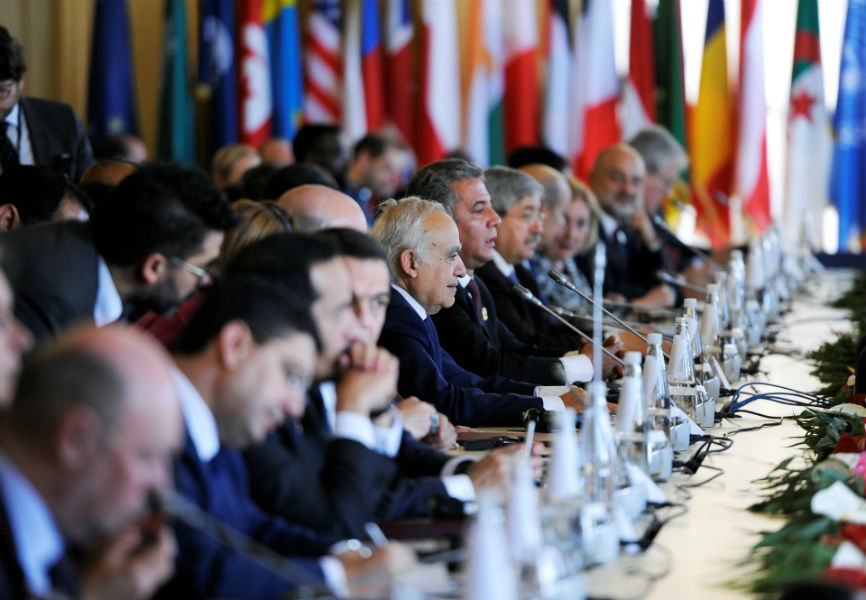The leaders of Libya's warring factions and international officials have gathered this week in Palermo, Italy, for a new round of talks just a few days after UN Special Envoy to Libya Ghassan Salame presented a new roadmap for peace. Eurasia Group experts
Ayham Kamel and
Sarah Alshaalan discuss the prospects for an end to the fighting and chaos that have gripped the North African country since NATO-backed rebels toppled former dictator Muammar Gaddafi in 2011.
What do the Italians hope to achieve at the conference?
The talks have focused largely on the new UN proposal, which calls for elections to be held in Libya early next year after a national conference hammers out an agreement on the poll's format. The proposal presented last week marked the first official recognition that it would not be possible to hold elections in the country on 10 December, as set out by a UN-brokered agreement reached at another summit held earlier this year in Paris. The Italians have made it clear that no new deadline for elections would be imposed; they have expressed an interest in making progress on other issues, such as unification of the army and the establishment of new state institutions.
The Palermo gathering also marks an attempt for Italy to reassert its influence in Libya. Along with most other Western nations and the UN, Italy backs the Government of National Accord (GNA), led by Prime Minister Fayez al Serraj. But the Tripoli-based authority has lately been losing its grip over the country's capital, and other factions in the country have been gaining power.
What is the current array of forces in Libya?
The GNA has depended on militias to impose law and order in Tripoli but never really controlled them. It failed in its attempts to demobilize and integrate the fighters into a formal security structure or regular army, and over the past year, the militias have become more and more unruly, clashing often among themselves. Meanwhile, strongman Khalifa Haftar has been consolidating and expanding the areas under his control from his eastern base of Benghazi. The Gaddafi-era general has the support of Egypt, the UAE, and Russia. France, Italy's chief rival for influence in Libya, recently switched its support to Haftar.
While the GNA in the west and Haftar in the east represent the country's two main power centers, they do not speak for all tribal and political groups. Libya is a fragmented country with numerous potential peace spoilers. On a positive note, while the two main power brokers are rivals, Haftar has been willing at times to work with the national unity government. For example, he controls the oil fields in the east but export operations are led by a Tripoli-based entity.
Why are Italy and France so involved in Libya?
Both countries have extensive investments in the Libyan energy sector. In addition to its geographic proximity, Libya boasts oil resources that are relatively inexpensive to extract and export. Italy's Eni has long been the largest foreign producer in Libya, though Total has been gaining ground. Earlier this year, it acquired a 16% stake in the Waha concession in the Sirte basin, a sign of renewed confidence and recognition of the opportunities the sector offers.
Furthermore, refugees from across Africa have been exploiting Libya's instability to cross over to Europe, with Italy as the main entry point into the continent.
About 650,000 have crossed the Mediterranean since 2014, most using Libya as their point of departure. And though Islamic State militants have been rooted out from Libya, other Islamist terrorist cells remain, posing risks for the broader region.
What are the next steps toward a resolution to the conflict?
The Italian-hosted conference got a boost from the arrival of Haftar, who hadn't confirmed his attendance until the last minute. Demands for his presence represent an international acknowledgement that he is an indispensable player. Also present are Serraj and foreign leaders such as Italian Prime Minister Giuseppe Conte and Egyptian President Abdulfattah el Sisi.
All stakeholders seem to be in agreement that elections are necessary to begin the process of unifying the country and ending the war. But differences remain over how to get there. The GNA is demanding a new constitution before proceeding; Haftar prefers to hold a vote as soon as possible to take advantage of his current strength. And it is far from clear that Haftar, as president or as a military commander, would accept civilian control over his forces. Still, the UN's Salame is thought to have a better shot than previous envoys at advancing the political process—he has worked diligently to engage not only the key actors but to build broader support for a settlement.

 U.N. Envoy to Libya Ghassan Salame attends the second day of the international conference on Libya in Palermo, Italy, November 13, 2018. REUTERS/Guglielmo Mangiapane
U.N. Envoy to Libya Ghassan Salame attends the second day of the international conference on Libya in Palermo, Italy, November 13, 2018. REUTERS/Guglielmo Mangiapane